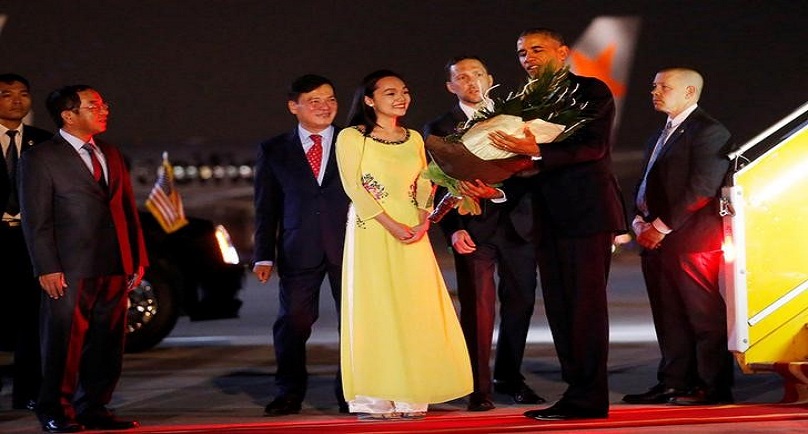
By Matt Spetalnick and Mai Nguyen
HANOI (Reuters) – U.S. President Barack Obama arrived in Vietnam late Sunday ahead of a three-day trip aimed at sealing the transformation of an old enemy into a new partner to help counter China’s growing assertiveness in the region.
Four decades after a war with Vietnam that deeply divided opinion in America, Obama aims to boost defense and economic ties with the country’s communist rulers while also prodding them on human rights, aides say.
His visit has been preceded by a debate in Washington over whether Obama should use the three-day visit starting Monday to roll back an arms embargo on Hanoi, one of the last vestiges of wartime animosity.
That would anger China, which resents U.S. efforts to forge stronger military bonds with Beijing’s neighbours amid rising tensions in the disputed South China Sea.
But in the hours ahead of his arrival in Hanoi, where he was greeted on a red carpet by foreign ministry officials, there was no immediate word of a final U.S. decision on the ban.
Vietnam’s poor human rights record is a sticking point, but the Obama administration appears increasingly swayed toward giving Hanoi some leeway to build its deterrent against Beijing.
Obama’s visit follows what the Pentagon called an “unsafe” intercept by Chinese fighter jets of a U.S. military reconnaissance plane over the South China Sea on Tuesday.
“Nobody has any illusions,” said Evan Medeiros, Obama’s former top Asia adviser. “This trip sends important signals to China about U.S. activism in the region and growing U.S. concern about Chinese behavior.”
Vietnam’s government earlier this month said lifting the embargo would show mutual trust and that buying arms from its partners was “normal”.
There has been much excitement about Obama’s arrival in a country with a young population enthusiastic about closer U.S. ties, and resentful of Vietnam’s economic dependence on its unpopular neighbour China.
“Obama visit to Vietnam is closure of the past,” said Hanoi cyclo driver Vu Van Manh. “What’s important is the present. The two countries can bond more to develop both economies.”
As a sign of the capitalism that now thrives in Vietnam, some opportunistic businesses are using pictures of a smiling Obama to sell suits and instant photo services.
Bilateral trade has swelled 10 times over since ties were normalised in 1995 to around $45 billion now. Vietnam is Southeast Asia’s biggest exporter to the United States, with textiles and electronics the largest volumes.
‘UPGRADE’ OF RELATIONS
Washington wants Vietnam to open up on the economic front and move closer militarily, including increased visits by U.S. warships and possibly access to the strategic deepwater harbor at Cam Ranh Bay, U.S. officials say.
“What we want to demonstrate with this visit is a significant upgrade in the relationship … even as we have areas of difference,” said Ben Rhodes, Obama’s deputy national security adviser.
But the trip will be punctuated by reminders of the past. Obama will be accompanied by Secretary of State John Kerry, who after a tour in Vietnam as a young Navy officer became an antiwar protester.
Obama will in Hanoi meet Vietnam’s triumvirate of leaders, President Tran Dai Quang, Prime Minister Nguyen Xuan Phuc and party chief, Nguyen Phu Trong. Phuc and Quang took office only last month.
Those meetings are almost certain to have the backdrop of busts of the late revolutionary Ho Chi Minh, revered by Vietnamese but widely reviled by Americans during a war that killed hundreds of thousands of Vietnamese and 58,000 U.S. troops.
In the commercial hub Ho Chi Minh City, formerly Saigon, Obama will meet entrepreneurs and tout a U.S.-led Trans-Pacific Partnership trade deal that is set to transform Vietnam’s manufacturing-led economy.
But the name of the city, once the capital of the now defunct South Vietnam, evokes searing images for many Americans of a final frantic U.S. airlift in 1975.
While Vietnam wants warmer ties, some among the party’s old guard remain suspicious that the U.S. end-game is to undermine their one-party rule. Obama arrived just hours after what was Vietnam’s five-yearly day of democracy, a parliamentary election in which nearly all the candidates were Communist Party members.
Obama plans to meet dissidents amid U.S. concerns about Vietnam’s heavy-handedness toward opponents. A long serving political prisoner was freed on Friday, in a possible gesture ahead of Obama’s visit.
(Additional reporting by Martin Petty in Hanoi and David Brunnstrom in Washington; Editing by Raissa Kasolowsky and Mark Potter)
Copyright 2016 Thomson Reuters. Click for Restrictions.


